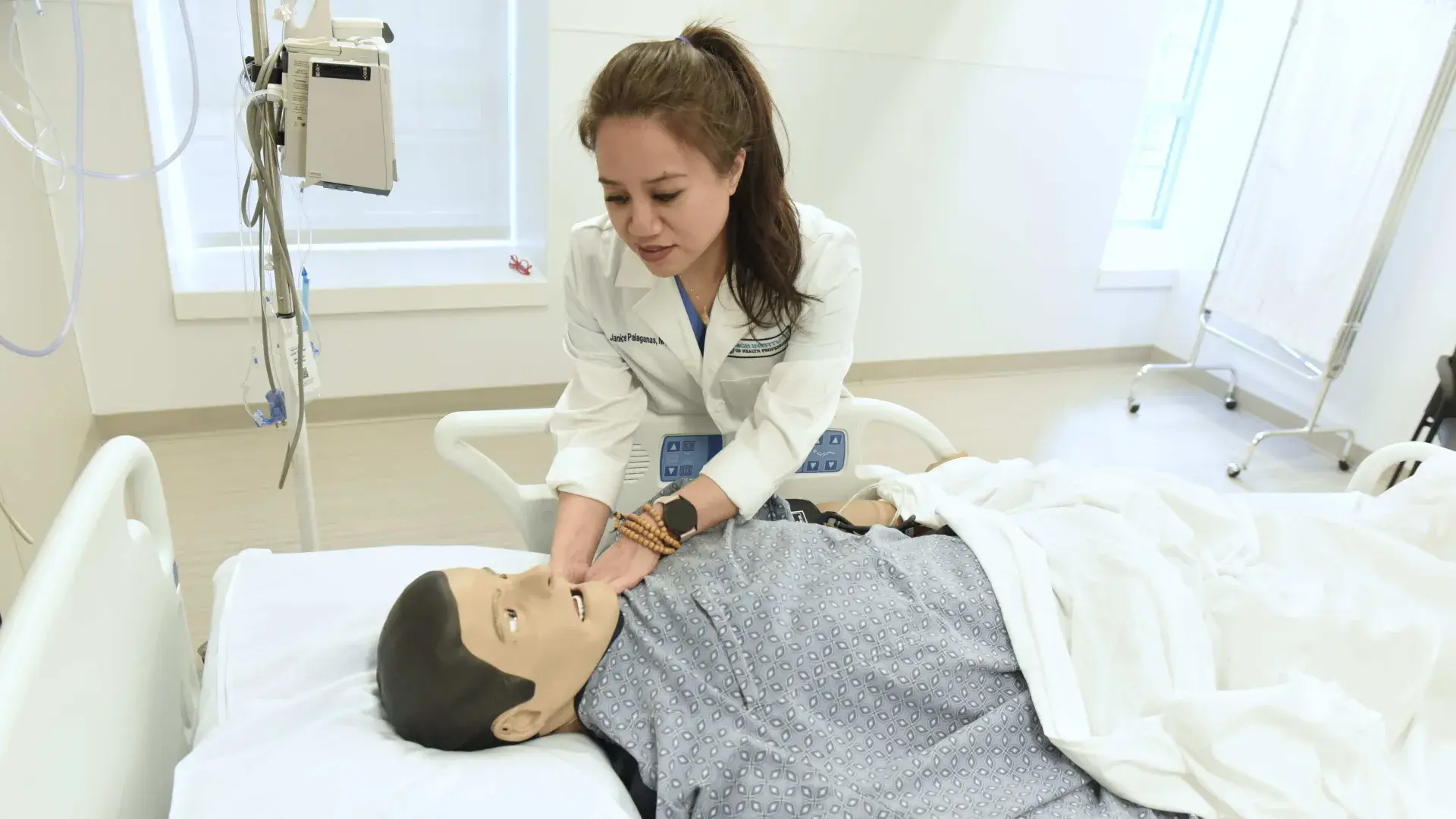
The Center of Excellence on Healthcare Simulation Research will be the first entity to focus exclusively on developing more effective simulation teaching methods through targeted research.
Simulation education in the health professions is widely used at colleges and medical facilities across the globe. While educators have implemented it in various ways, what’s been missing is research that can rigorously test and compare accepted practices and identify and develop more effective simulation learning experiences.
That’s about to change.
The MGH Institute’s new Center of Excellence on Healthcare Simulation Research has been created to advance the field of simulation-based educational scholarship.
The center, which will be led by Dr. Janice Palaganas, a professor of health professions education and a leader in healthcare simulation, is the first of its kind to focus on simulation research. She will direct efforts to increase scholarship and offer seminars and workshops with the goal of developing better ways to teach simulation education to healthcare professionals, further expanding the Institute’s position as a thought leader in the field.
“Simulation needs a center dedicated to researching the effectiveness of traditional and new methods to help inform and guide research and education for the field,” said Palaganas, who has taught simulation education for 20 years. “We have the expertise at the Institute to do that and I’m excited that this new center will be harnessing that for new discoveries and innovations in how we teach and how we can best implement simulation-based education technologies to improve training outcomes throughout a clinician’s career.”
Funded by part of the proceeds of a recent multi-million-dollar gift to the Institute, the center will build upon the capabilities in the Department of Health Professions Education (HPEd), which includes several faculty who are internationally known for their expertise on the topic and related fields that can inform simulation-based education science.
The research focus will include the cognitive neuroscience of experiential teaching methods in distance simulation, the cognitive neuroscience of feedback conversations, and generative AI approaches using healthcare simulation for educational assessment.
Palaganas envisions taking a new look at existing practices and procedures of using mannikins and simulated participants, paid actors who portray a specific patient case or patient scenario when interacting with students. She noted that it’s widely accepted for students to work with simulated patients alone, while educators observe the interaction from behind a one-way mirror. The educators come into the room afterwards to provide a debriefing of what went well and what could have been done better.
“That's the way everyone is told you're supposed to do it,” she said. “But that’s not what usually happens when students have a clinical experience with a live patient. What if it’s better for faculty to be in with the students in a simulated environment? It’s those type of things that we really want to study - why do we do things the way we do it, and is it really the best way to do it? And by doing that, we can better understand every facet of the tools and change how it’s used to make it more effective for educators, including how artificial intelligence innovations can be appropriately utilized.”
The adoption of simulation education has increased over the last three decades as a way for clinicians to practice and keep patients safe. The Covid-19 pandemic that started in 2020 propelled its use when students were prevented from having clinical experiences with patients. Attention to patient safety has led to an increased acceptance within healthcare to apply simulation techniques to educate new students and improve the patient-care skills of existing practitioners.
“The healthcare world realized it had to think about learning remotely and learning with simulation, forcing a reevaluation of how we acquire knowledge and deliver care,” said Dr. Roger Edwards, chair of the Institute’s HPEd department, which offers masters and doctorate degrees with a concentration in simulation. “With the new center, we’ll be able to gain new insights and collect data that haven’t been collected before which can lead to insights about the cognitive neuroscience of learning, the durability of what is learned, and how to apply it. And one of Janice’s strengths is her ability to integrate clinical, translational science, and education.”
The above-mentioned workshops and seminars will play a key role in the effort. Not only will they help faculty develop research skills, they also will provide opportunities to discover simulation techniques, how best to implement these methods, and suggest new theories.
Dr. Nara Gavini, the Institute’s associate provost for research, envisions the workshops to be a fertile ground for encouraging scholarship that can lead to peer-reviewed publications and external grant funding to make contributions to the field.
“Simulation is a technique, so the real question is about how it can be used in different areas of research related to experiential teaching methods in nursing, physical therapy, speech-language pathology, and occupational therapy,” said Gavini, who noted the IHP will provide small seed grants to faculty to help kick-start the process. “Showing how we can use simulation-based education throughout healthcare is how we advance simulation education.”
Taken together, the center promises to be an epicenter of simulation education using empirical research to generate and test hypotheses for effective training of health professionals.
“The IHP has always been strong in clinical education, it's always been strong in health professions education, and it's always been strong conducting translational science,” said Edwards. “This center will unite these three threads, weave them together, and develop a better understanding of the science of learning.”
Do you have a story the Office of Strategic Communications should know about? If so, let us know.
